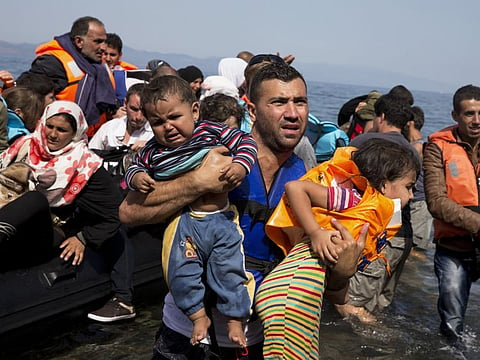Refugee crisis must sear global conscience
Annual UNHCR report makes for depressing reading, with almost 71m living as refugees

We live in a world where almost 71 million people are living as refugees, unable to have a home of their own and reliant on the international community for support, sustenance or assistance. That’s a startling number, one that the United Nations High Commission for Refugees annual report represents. It adds that the 2018 figure of 70.8 million is likely low, and that the mass exodus of people leaving the political and social upheavals behind in parts of the world (like chaotic Venezuela) most probably means that figure exceeds the 73 million mark, if not more.
Sadly, since the days of its creation in the aftermath of the Second World War, the general reporting trend for the UNHCR has been but upwards as generations of successive political leaders have failed to come to grips with the challenges faced by the displaced and dispossessed. Over the past 20 years, the number of desperate and desolate has doubled.
We live in a region where upheaval and the consequences of conflict, ethnic and political strife has created a floating genus of persons, cast on the tides as flotsam and jetsam, searching on the four winds for a place of stability and security. Sadly, whether those refugees be as a result of the conflict that has ripped asunder Syria and Iraq, or whether they be from the uncertain times and uncertain places of the Sahel and beyond, they find no welcome mat at the doorstep of Europe. With the exception of German Chancellor Angela Merkel, whose influence and leadership has been rightly noted by the UNHCR, there is a failure to engage for the rights of refugees.
Only when nations that are privileged, secure and prosperous begin to care and share, will these refugee numbers be reduced.Gulf News
Right now, the right-wing government in power in Italy is processing criminal prosecutions against humanitarian workers who plucked desperate and drowning people from the perilous Mediterranean. Today, along Cox’s Bazaar, in crowded camps, harried Bangladeshi officials try to provide succour to nearly a million Rohingya, victims of ethnic cleansing by a complicit government of Myanmar acting in cohort with thugs.
The UN report does not make for comforting reading. Nor should it. If it provides a spur to action for the complacent or pricks the conscience of the comfortable, then it shall succeed to draw attention to the plight of so many forgotten in so many corners of the world. Only when nations that are privileged, secure and prosperous begin to care and share, will these refugee numbers be reduced. And that is a long way off.



